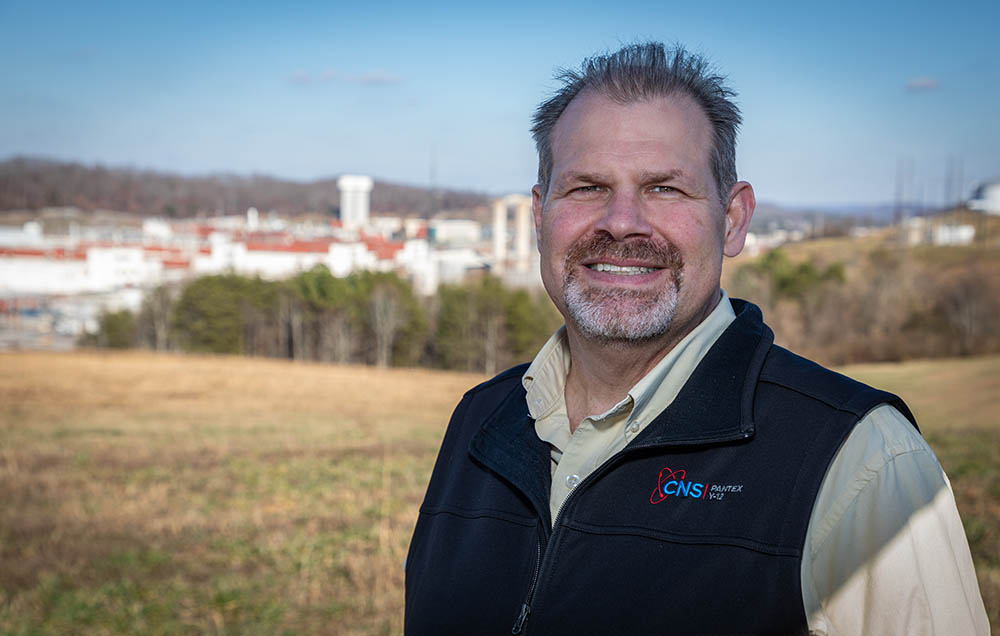I am Mission Success: Mike Robinson

Take 5 minutes to learn about CNS Vice President of Project Management Mike Robinson. He oversees infrastructure modernization work at both Pantex and Y-12. All views and opinions are the employee’s own and do not necessarily reflect those of CNS.
Mike Robinson is in the middle of a climb. It’s a metaphorical climb up a very real mountain of infrastructure modernization work at both Pantex and Y-12. The work includes the programmatic plans and master site plans at both sites that identify new equipment and infrastructure to be installed and constructed. Robinson, vice president of Project Management, has purview of all the capital projects and many expense projects at both Pantex and Y-12, excluding the Uranium Processing Facility (UPF). He’s been in his current role for a little over a year now, but as a principal vice president with Bechtel, it’s a continuation of a lifelong career.
“The reality is in 30-plus years with Bechtel, I’ve moved over a dozen times and covered twice that many different projects or positions; it’s going where the work is needed to address challenges,” Robinson noted.
One challenge that surprised Robinson when he joined CNS was the gravity of the work versus the state of the buildings it’s completed in.
“Our people — not just within Project Management, but across CNS — find ways to be successful in facilities that have overreached their life expectancy,” Robinson said. “In FY 2023, under an increasing workload, CNS not only met but exceeded production goals. Integrated teams across CNS especially demonstrate just how important each person is to overall mission success.”
Project work is increasing to meet both current repair needs as well as to prepare the sites for the future. Buildings like the new fire station and Emergency Operations Center at Y-12 are clear examples of how new facilities improve not only the work, but also morale. For anyone who works on projects, the on-the-job daily problem-solving has a tangible outcome.
“The passion for the mission extends across the board, throughout the different departments and up and down the ladder, so to speak,” Robinson said.
How has working for CNS changed or reinforced your thoughts on our mission?
Not changed, but reinforced my thoughts on the mission. I appreciated that before, but I’ve gained additional insights into specifics of what projects we are doing to support future mission needs. I also think we’re at a time when the global environment is evolving, and it fully reinforces why our mission is needed or important. We want to play our part by safely and efficiently implementing our infrastructure modernization.
Are you doing what you envisioned as a young adult? If so, describe how you got here.
Absolutely not. I would describe it as a long strange trip. My dad and my uncle were engineers, and my brain seemed wired to build and disassemble things as a kid. I fed that spark by getting a mechanical engineering degree and then headed into the field working construction. I’ve been involved in projects and operating facilities for my entire career. I’ve always gotten satisfaction from completing projects or solving problems, and I have fond memories of the people on the teams we’ve developed along the way.
What work advice would you offer someone who is new to Pantex or Y-12?
Ask questions. Seek to gain insight from your coworkers about both the work at hand and how it fits into the mission. Getting back to similarities in the sites, it is that general pride in support of the mission that is inspiring. I think that’s unique to these sites because there’s a longer view than just any one project.
Why is it important we hold ourselves accountable in our daily tasks?
We’re all part of some plan; we all have roles and responsibilities to make it work. By holding ourselves accountable, we’re working to support the mission. If you’re not doing what you’re accountable for, you’re letting someone down. As an example, all projects have challenges — there hasn’t been a project in the history of the world that hasn’t had challenges. Good teams identify and attack issues, so being accountable prepares you to address the challenges of that project. It takes the village to complete our projects, and we need to be accountable so we don’t burden each other.
